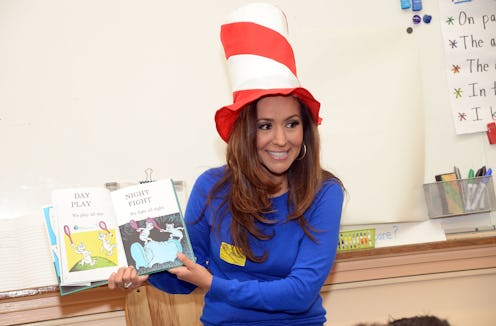
For many of us who have grown up as lifelong readers, we harbor memories of being read to by a loved one. But these are more than just cherished moments; studies have shown that being read aloud to helps foster literacy and aids in independent reading, in addition to strengthening communication skills, developing social bonds, and encouraging empathy. So today, on World Read Aloud Day 2017 (#WRAD17), take a moment to thank whoever was willing to read your favorite picture book with you 7,000 times in a row. They're at least in part responsible for your overall awesomeness.
In a 2015 study from the University of California, Santa Cruz, Dominic Massaro, professor emeritus, found that picture books were two to three times more likely to include vocabulary that falls outside of the 5,000 most common English words than a parent-child conversation. "We talk with a lazy tongue," he told EdSource. That "lazy tongue," with its emphasis on pronouns and reliance on context, can hinder a child's path to literacy. It's reading that most directly helps children with word mastery and grammar; it's also reading that serves as an equalizer, combatting the belief that children with "professional" parents are exposed to upwards of 30 million more words by the age of three than children whose parents are in a lower socio-economic tier.
The evidence for sharing books is strong enough that in 2014, the American Academy of Pediatrics announced a new policy: read to your children from birth. In addition to strengthening the building blocks of literacy, it prepares kids to be lifelong students.
The great news? Since this policy was released, parents reading aloud before their children reach a year old has jumped to 40 percent, according to the recently released Kids & Family Reading Report by Scholastic. In addition, 62 percent of parents of three to five-year-olds are now reading aloud at least five days a week. If anyone ever questions whether the future generations are going to save us from our current global predicament, you can quote these statistics to them. There are some seriously communicative, empathetic humans coming up the ranks right now.
The practice of reading aloud tends to taper off by the age of six, though, once kids are able to read on their own, despite the 2015 finding that children who read the most for pleasure experienced reading sessions through the age of ten or eleven. So whether it's with your younger siblings, cousins, students, nieces or nephews, try suggesting a co-reading session today. Honestly, our future kind of depends on it.